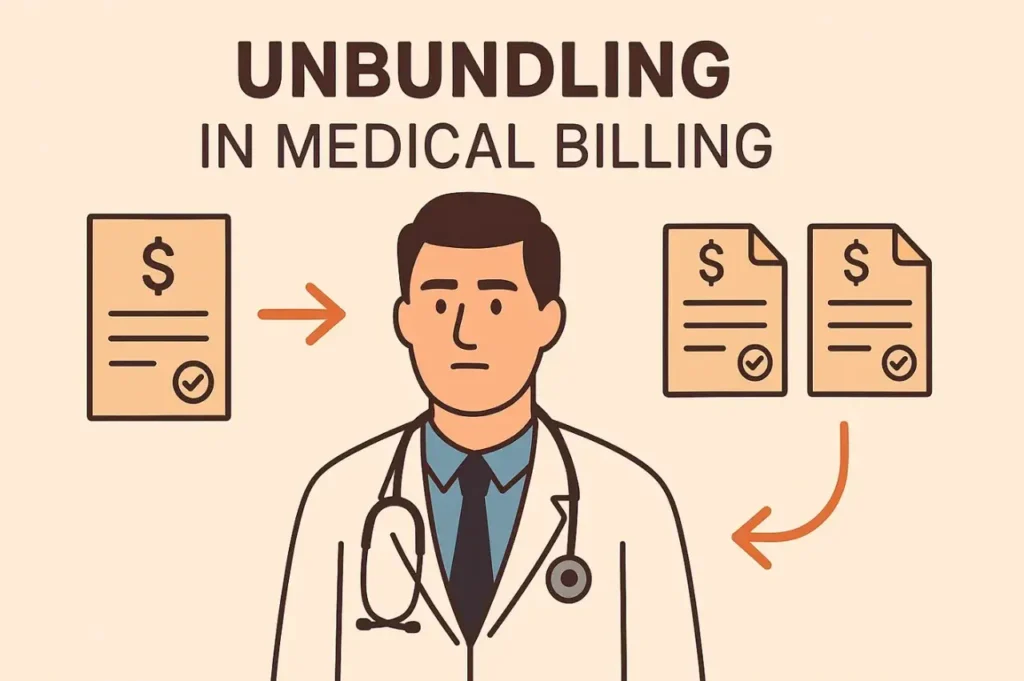Table of Contents
ToggleThe Meaning and Risk of Unbundling in Medical Billing
Unbundling in medical billing refers to the improper practice of using multiple CPT (Current Procedural Terminology) codes to bill separately for individual components of a procedure that are normally covered under a single, comprehensive code. This results in inflated charges and may constitute overbilling or even fraud if done intentionally. Unbundling in medical billing can lead to serious compliance issues, especially when repeated unbundling practices are flagged by auditors.
Why Unbundling in Medical Billing Matters
When healthcare providers submit claims, they are expected to use the most accurate, comprehensive code that reflects all services performed. Unbundling misrepresents services by making them appear as distinct when they should be combined, potentially leading to:
- Higher reimbursements than justified
- Compliance violations
- Increased risk of audits and penalties from payers, especially Medicare and Medicaid services
Unbundling also occurs when a coder charges separately for a minor service already included in a major service.
Common Causes of Unbundling in Medical Coding and Medical Billing
Unbundling doesn’t always stem from ill intent – sometimes it’s the result of outdated workflows or simple oversight. Regardless of the reason, identifying the root cause is essential to maintaining billing accuracy and compliance. Unbundling may occur due to multiple factors and often occurs when a coder does not fully understand bundling rules:
- Lack of understanding of CPT coding guidelines
- Absence of certified coders
- Deliberate intent to increase reimbursement
- Failure to use CMS’s National Correct Coding Initiative (NCCI) edits
- Unbundling caused by a coder who lacks experience or context
- Errors from a coder who does not understand the nuances of medical coding systems
Examples of Unbundling (based on CMS NCCI guidelines)
1. Overlapping Procedures Billed Separately
If a surgeon performs a laparoscopic cholecystectomy with intraoperative cholangiography, the correct CPT code is 47563. It is incorrect to bill CPT code 47562 (laparoscopic cholecystectomy) and CPT code 47564 (cholangiography) separately. These services should not be coded using multiple procedure codes when a single comprehensive code describes the services.
2. Bilateral Procedures Split into Two Unilateral Codes
For bilateral knee arthrograms, the correct CPT code is 73542. Billing CPT code 73541 twice (once with LT and once with RT modifiers) unbundles a bilateral procedure code improperly. This violates the NCCI rule against using two unilateral procedure codes where a single bilateral code applies.
3. Minor Service Already Included in a Major Service
When performing a colonoscopy with polypectomy, the correct CPT code is 45385. It is not appropriate to bill CPT code 45378 (colonoscopy) and CPT code 45383 (polypectomy) together. The major service assumes the minor service and must be reported as a single procedure.
4. CPT Code Errors When Fragmenting Endoscopic Procedures
A diagnostic anoscopy with biopsy should be billed using CPT code 46606. Reporting CPT code 46600 (diagnostic anoscopy) plus CPT code 45100 (anorectal wall biopsy) is improper and results in unbundling errors. Many coding mistakes happen with procedures involving endoscopy due to the complexity of guidelines.
5. Billing Integral Components Separately
Anesthesia is integral to a more comprehensive procedure and should not be billed separately. For example, CPT code 00300 (anesthesia) should not be reported in addition to CPT code 63047 (laminectomy). Attempting to unbundle services that are integral violates compliance practices.
Providers should only report a biopsy separately when pathology leads to an immediate decision for excision or removal of the same lesion. It’s not acceptable to report a biopsy separately to assess resection margins or verify resectability after the primary procedure has been completed.
The Centers for Medicare and Medicaid Services (CMS) developed the NCCI to help coders apply the correct billing practices. One example includes identifying when a single code should be used instead of breaking it into component parts.
How to Avoid Unbundling
Avoiding unbundling starts with a proactive approach to education and process oversight. Whether you’re building a new team or refining your existing workflow, the following strategies can help keep your billing clean and compliant. Reducing unbundling in medical billing starts with training and software that guides coders toward accurate and ethical coding.
Another key step is documenting every procedure in detail, ensuring the assigned CPT code accurately reflects the complexity and scope of what was performed. Coders should understand the CPT coding system and routinely review updates from the Centers for Medicare & Medicaid Services (CMS), especially NCCI guidelines. Using modern billing platforms that flag potential unbundling issues in real time can also prevent costly mistakes.
Proper communication between physicians, coders, and billing teams is essential. When medical procedures are complex or borderline, it’s better to consult certified medical coders before submission to avoid errors that might trigger audits.
- Follow the NCCI edits and CPT guidelines strictly
- Use certified medical coders who understand bundling rules
- Perform regular coding audits to identify potential instances of unbundling
- Use billing software with automated NCCI edits that alert when codes should be bundled
Why It Matters to Your Practice
Even one instance of improper coding can jeopardize your payer relationships and bottom line. When coders unbundle a procedure intentionally or due to misunderstanding, it can lead to:
- Denials and delays in payment from insurance companies like Medicare and Medicaid
- Legal consequences, penalties, and accusations of fraudulent billing practices
- Reputational harm that affects future revenue and payment integrity
Unbundling can be a red flag during payer audits, especially if tied to repetitive behavior.
Protect Your Practice with Smarter Billing
Unbundling may seem like a small coding error, but its consequences can be severe. Unbundling in medical can even trigger legal scrutiny. Staying compliant with CPT code guidelines protects your revenue and ensures ethical billing practices. Always use the code that describes the services fully without separating component parts or unbundling codes unnecessarily.
Medical procedures should be coded based on the full scope of what was delivered-not split apart to increase the charge. When a physician performs both minor and major services, they should rely on a single comprehensive charge whenever applicable. If an examination includes multiple elements of a surgical process, it’s essential not to fragment them into separate codes.
At Swift Medical Billing, our certified coders and medical billers ensure every service or procedure is billed properly. We help healthcare providers maximize reimbursement while avoiding billing code errors and staying compliant with Medicare rules.
Concerned about your current billing practices? Contact Swift Medical Billing today and let our experts review your medical coding for accuracy and compliance.




